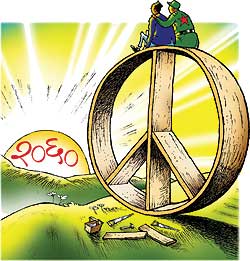 Quite astonishing, how one gets used to peace. It is difficult to imagine that this time last year we were living through some of the most horrific days of the insurgency. An emergency was in force, editors were being detained, schools had closed down all over the country, nearly 100 people had been slaughtered in Mangalsen and Sanfebagar, and a $20 million powerplant in Jhimruk had just been destroyed. Peace had never looked so distant.
Quite astonishing, how one gets used to peace. It is difficult to imagine that this time last year we were living through some of the most horrific days of the insurgency. An emergency was in force, editors were being detained, schools had closed down all over the country, nearly 100 people had been slaughtered in Mangalsen and Sanfebagar, and a $20 million powerplant in Jhimruk had just been destroyed. Peace had never looked so distant. And yet, here we are one year later, watching the Maoist ideologue-in-chief shaking hands with a royal-appointed prime minister. The prime minister says he was tricked, but for ordinary Nepalis it was the first tangible proof that this peace may be the real thing. The two sides may have different reasons for stopping the fight, but they have one reason in common: the overwhelming public opinion against conflict (see 2060).
This is also the last week of the 2050s. Politically, this has been a lost decade. A decade of unkept promises where selfishness, short-sightedness and a complete disregard for the national interest took its toll. Even so, progress was made in education and health. Local self-governance was beginning to work-hinting at how much more we could have achieved in the past ten years if only our national-level political leaders were more accountable.
Alas, disillusionment and apathy with democracy set the stage for the flames of the peoples' war to spread. It is clear now that the Maoists were not particularly clever or strong, it was just that successive elected governments were so feckless, faction-ridden and preoccupied with power. They are back to their antics this week, trying to be more radical than the Maoists by raising the republican slogan. For their part, the Maoists are being deliberately contradictory to confuse everyone, and taking advantage of the anarchy on the streets.
It makes us glad to see the Maoist leadership out in the open, even if they are threatening to go back to the jungle with every breath they take. In the coming weeks, the novelty of hearing their speeches will wear off, and hopefully the mainstream media will not devote so many column inches to the comrades unless they have something particularly important or jargon-free to say.
But the euphoria of the ceasefire should not make us go overboard to let our revolutionaries, who are still technically underground and haven't yet renounced violence, to pretend that they are already on an election campaign trail. By their own admission, the Maoists are outlaws and don't believe in the constitution. But that does not put them beyond the purview of international humanitarian law. As an insurgent movement, the Maoists have an obligation to ensure maximum protection of citizens within their control within peacetime and war.
The government has lifted the Maoists' terrorist label, retracted the Interpol notice, but if the Maoists are genuine in their desire to return to the democratic mainstream this would be an appropriate moment to declare unequivocally that they will abide by international covenants on humanitarian law. What this means on the ground is a strict adherence to the Code of Conduct on threats, intimidation, extortion, forced recruitment, display of weapons. Without that, and with the experience of the previous truce, the Nepali people will have every right to doubt the sincerity of their words.
Both the Maoists and the security forces need to break the cycle of impunity as a basic groundwork for peace-building so that Nepalis do not lose another new year. And another decade.


